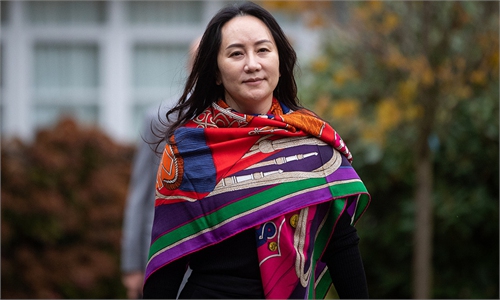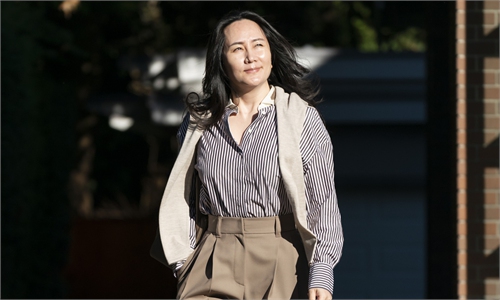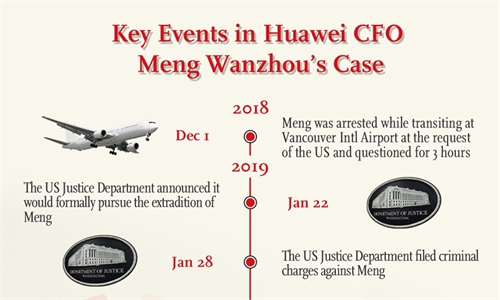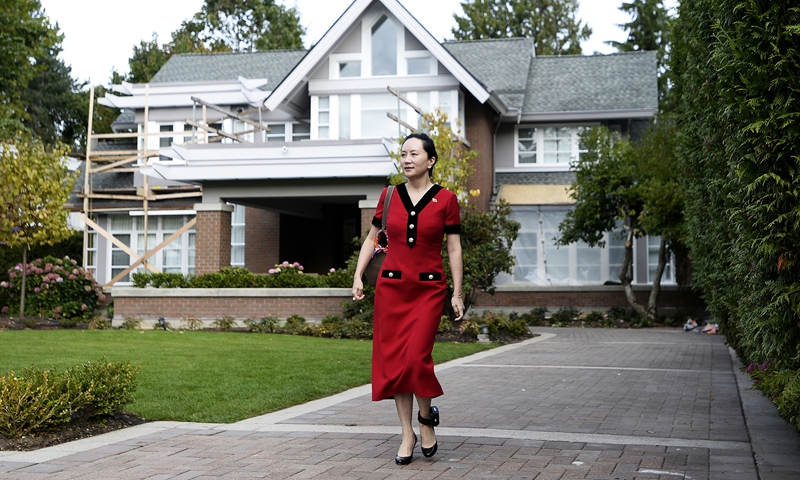
Meng Wanzhou Photo:VCG
Two years ago, nobody would imagine how the arrest of Huawei's chief executive officer Meng Wanzhou would change the course of relationship between Canada and China - one of Canada's largest trading partners - putting Ottawa into an extremely difficult situation. It has ever since become a real test of political wisdom for Justin Trudeau, who was urged to take Canberra's predicament with China as a lesson, observers said.
With more Canadian politicians calling for Meng's release, the high-profile case has been consistently drawing attention from Chinese authorities, academics, business and ordinary citizens, as they agree on the political nature of the case, saying the so-called Canada's judicial independence had been severely pillaged by the Trump administration amid escalating US-China confrontations.
The 48-year-old senior executive of the Chinese high-tech firm, who is also the daughter of Huawei's founder Ren Zhengfei, was arrested at Vancouver International Airport on December 1, 2018 at the request of the US, and faces fraud charges. After the US Department of Justice formally announced it would pursue the case on January 22, 2019, the legal battle began, as two months later Huawei sued Canada over the arrest for violating her constitutional rights, and just two days after Canada had approved the extradition order of Meng to the US.
While the extradition lawsuits usually take years, Meng's defense team has been challenging Canada's order for its political nature, double criminality and abuse of process. After Meng lost her double-criminality challenge when Canadian prosecutors ruled in May that the fraud charges against her in the US would also constitute a crime in Canada, the claims of the abuse of process have become major arguments for Meng's lawyers to challenge authorities in a bid to end the case and get her released.
Over the past two years, China-Canada relations have quickly deteriorated, as more observers doubted whether it's a smart move for Ottawa to put itself in an escalating geopolitical rivalry between two major powers - the US and China. Meng, often deemed as a "hostage" amid the China-US trade and tech war, has also put the Trudeau administration into an unprecedented crisis as such worsening ties weighed on trade, business and people exchanges between China and Canada.
From pork, to canola, to logs, Canada has felt the pinch. Previously, China had accounted for 40 percent of all Canadian canola seed, oil and meal exports. Canola seed exports to China were worth $2.7 billion in 2018. However, three Canadian canola companies were suspended from exporting to China in March 2019. This was followed by more meat products from Canada being suspended for food security reasons, media reported.
With more evidence suggesting there's gross abuse of process concerning the case, some Canadian politicians, legal experts and Chinese officials have been calling for the release of Meng. With the victory of Joe Biden, it's time to resolve this dilemma as the new US government is set to adjust its China policy in the coming months, some experts said.
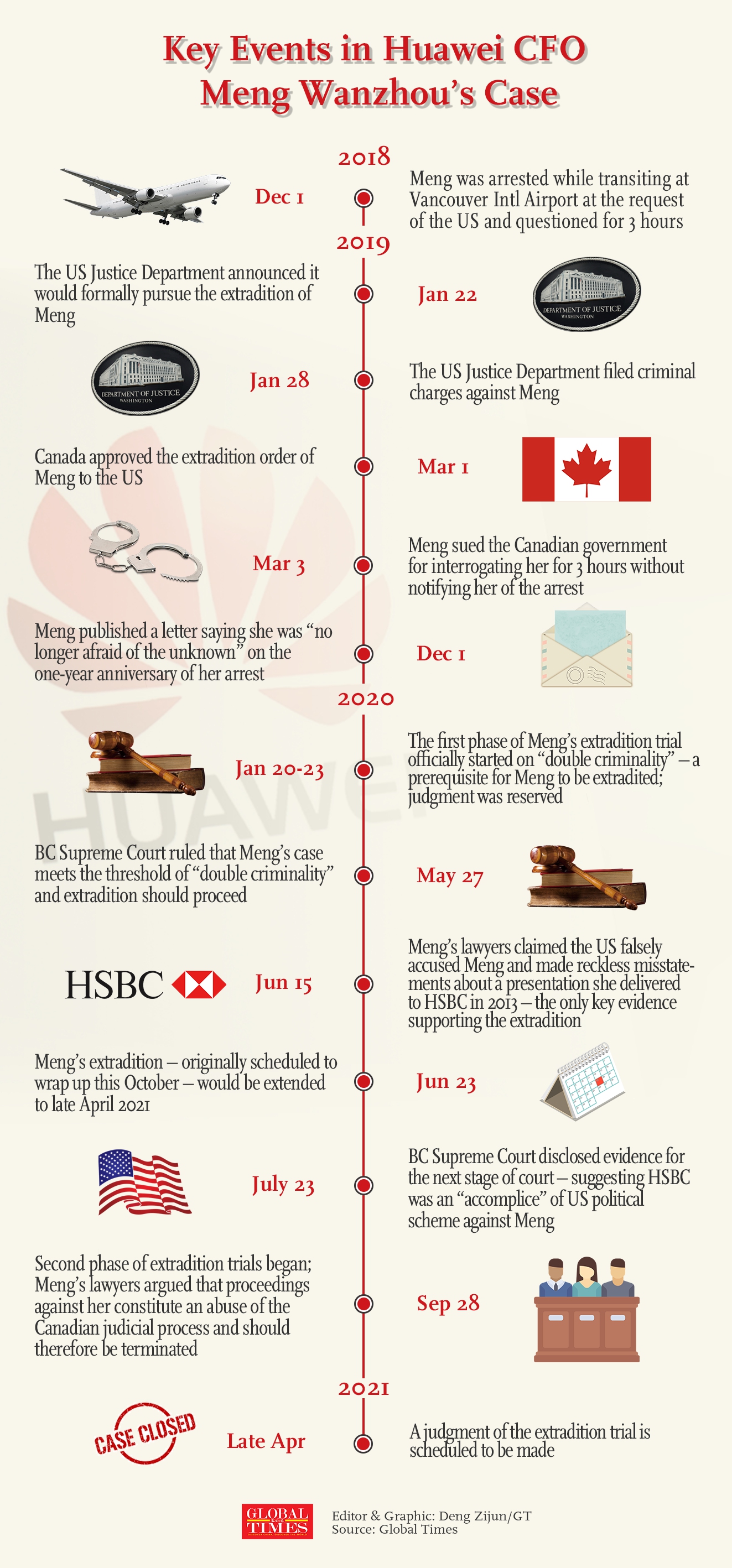
Key Events in Huawei CFO Meng Wanzhou's Case Infographic: GT
More evidence
In the latest hearing in Vancouver, Meng's defense team accused Canadian law enforcement personnel who engaged in the arrest, including Royal Canadian Mounted Police and the Canada Border Services Agency, of violating due process and Meng's basic rights such as deliberately delaying the execution of the warrant and illegally providing identifying information about Meng's electronic devices to the FBI, according to documents obtained by the Global Times.
Meng should have been immediately arrested and "read her rights" by either the border agents or the police, said Tim Taylor, Queen's Counsel (QC), a Partner at King & Wood Mallesons in Dubai, adding that instead of that, she was detained for three hours by border agents and made to turn over her laptop, phones and passwords by the border agents pretending it was a regular immigration check and without arresting her properly.
"The US has to make a fair presentation of the evidence which it says justifies extradition. The two key wins by the defense team give them a real shot at showing the evidence was not presented fairly," Taylor told the Global Times in an email on Monday.
While gaining more opportunities to challenge the extradition through an abuse of process, an increasing number of Canadian politicians including Green Party MP Paul Manly and New Democrat MP Niki Ashton recently joined a "free Meng Wanzhou" campaign in an attempt to save souring Canada-China ties. And the Canadian government has the legal authority to set Meng free immediately, former federal justice minister Allan Rock was quoted as saying in local media reports in Canada in June.
"If its arresting process is illegitimate, Canadian authorities should let her go," Shen Yi, a professor at the School of International Relations and Public Affairs of Fudan University, told the Global Times on Monday. On the legal basis, there is still room for Canada to adjust its approach on this matter instead of being entangled in politics.
Implications of Biden win
While US president-elect Biden may adopt a different approach toward China, considered as not as confrontational as Trump's China policy while seeking cooperation in certain areas, as some observers forecast, some academics in Canada have been questioning whether the incoming US president would help Canada on Meng's case, offering a window of opportunity for solving this dilemma.
Trudeau also turned to Biden on the arrest of Meng in November, after he described China's diplomacy as "coercive" and "ineffective." However, some Chinese experts see him as an "immature and unwise" politician who lacks political courage to admit his faults on the case, while continuing to ignore the fundamental interests of Canada.
The Biden administration is unlikely to directly drop the charges against Meng. But as the case has reached this stage, the ball is in Ottawa's court, Shen noted.
"If Trudeau is smart, he would create a 'buffer' between China and the US," he said.
Some Chinese observers also pointed out that Canada should avoid becoming "the next Australia" as the Morrison administration has been paying a heavy price for being Trump's hatchet man by challenging China's fundamental interests.


